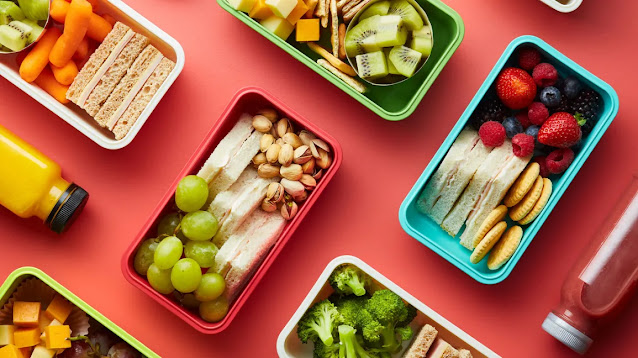Introduction:
Having a healthy diet and proper nutrition is vital for maintaining overall well-being. By making simple changes to your eating habits, you can significantly improve your diet and provide your body with the essential nutrients it needs. In this article, we will explore some practical tips to help you enhance your diet and nutrition in a straightforward and sustainable way.

Image source: Healthline
Eat a Variety of Foods:
Aim to include a wide range of foods in your diet. This ensures that you obtain a diverse array of nutrients. Include fruits, vegetables, whole grains, lean proteins, and healthy fats in your meals. Experiment with different colors and textures to make your plate visually appealing and enjoyable.
Pay attention to portion sizes to avoid overeating. It's not just what you eat but how much you eat that matters. Use smaller plates and bowls to help control portions. Listen to your body's hunger and fullness cues and eat until you are satisfied, not overly stuffed.
Include Fruits and Vegetables:
Fruits and vegetables are packed with vitamins, minerals, and fiber. Aim to have at least five servings of fruits and vegetables each day. Incorporate them into your meals and snacks. Fresh, frozen, or canned options are all good choices. Remember, variety is key.
Choose Whole Grains:
Swap refined grains for whole grains to increase your fiber intake and promote better digestion. Whole grains like brown rice, quinoa, whole wheat bread, and oats are rich in nutrients and can help you feel fuller for longer periods.
Limit Sugary and Processed Foods:
Highly processed foods and those with added sugars provide little nutritional value and can contribute to weight gain and various health issues. Minimize your intake of sugary snacks, sodas, processed meats, and fast food. Instead, opt for whole, unprocessed foods as much as possible.
Stay Hydrated:
Water plays a crucial role in maintaining good health. Stay hydrated by drinking an adequate amount of water throughout the day. Carry a water bottle with you to ensure you have access to water whenever you need it. Limit sugary beverages and opt for water, herbal teas, or infused water instead.
By cooking and preparing your meals at home, you have control over the ingredients and cooking methods. This allows you to make healthier choices and avoid excess salt, sugar, and unhealthy fats. Experiment with new recipes and cooking techniques to keep your meals interesting and flavorful.
Practice Mindful Eating:
Slow down and savor your meals. Pay attention to the flavors, textures, and smells of the food you are eating. Avoid distractions like phones or TVs while eating. Mindful eating helps you become more aware of your body's hunger and fullness cues, preventing overeating.
Seek Professional Advice:
If you have specific dietary needs or health concerns, consider consulting a registered dietitian or nutritionist. They can provide personalized guidance and develop a tailored nutrition plan to meet your individual needs.
Conclusion:
Improving your diet and nutrition is a gradual process that involves making small, sustainable changes to your eating habits. By incorporating a variety of nutrient-rich foods, practicing portion control, and being mindful of your choices, you can enhance your overall health and well-being. Remember, it's not about perfection, but about making progress towards a healthier lifestyle.












0 comments:
Post a Comment